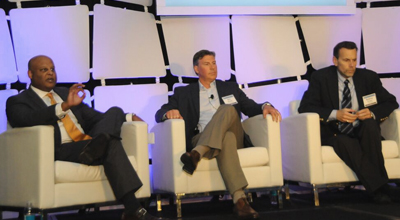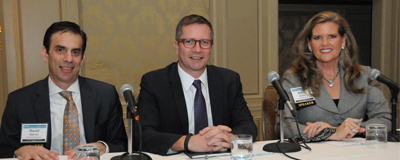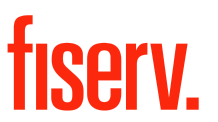
The sold-out 2017 MMI Sales & Marketing Leadership Summit drew 245 attendees to West Palm Beach on March 21-22. Widely recognized as a “must-attend” event for the investment advisory solutions industry’s most senior sales and marketing executives, the theme of this year’s Summit was Embracing Change: New Models in Distribution. Program sessions focused on the major trends reshaping the delivery of financial advice and how they are driving new paradigms in sales, marketing and business practices.
Here’s a quick recap of some of the highlights:

Two Generations of MMI Leadership
The evening before the Summit, 32 participants from the first two classes of Leadership Pathway, MMI’s leadership development program for next-generation advisory solutions professionals, joined members of the MMI Board of Governors for a networking reception. The next morning – before the official kickoff of the conference – the Board had a very productive and engaged meeting, and the Leadership Pathway group enjoyed a working session with comments and insights from industry veterans Lori Hardwick, Cheryl Nash, and Steve Plump.
MMI President and CEO Craig Pfeiffer opened the Summit with a review of the five key pillars of MMI member benefits and services – membership experience, data and analytics, education and professional development, next generation initiatives, and industry developments and advocacy. He also welcomed BNY Mellon as MMI’s exclusive Titanium Partner for 2017 and Fiserv as a Platinum Partner, noting that MMI looks forward to leveraging the resources and expertise of both firms on behalf of members during MMI’s 20th Anniversary year. Next MMI Chairman John Sweeney spoke passionately about the importance of finding ways to help shape the next generation of investors, and Summit Co-Chairs John Brett of Pershing LLC and Steve DeAngelis of FS Investments welcomed the audience and reviewed the program of events.

Thriving in the New Abnormal: North American Asset Management
In his opening keynote presentation, Ju-Hon Kwek, Head of McKinsey’s North American Asset Management Practice, struck both optimistic and cautionary notes about where the asset management industry is headed. He presented a snapshot of the industry’s growth over the last ten years and made some intriguing predictions about what tomorrow’s financial services industry will look like.
Although the last decade was a period in which assets rose steadily, there exists a quandary: asset levels are at new historical highs, but flows turned negative in 2015 for the first time in five years. Price compression of 4% to 5% has occurred over the last five years, half attributable to the significant growth in passive investments and half to price cutting. Over the same period, average flows to the market have been steadily declining while a flood of new products has been adding a vast amount of operational complexity. Simultaneously, industry consolidation has been increasing as the advantages of scale continue to play out. The net result: average profit margins for North America asset managers took a turn for the worse in 2015 as revenue and cost margins deteriorated and total costs continued to grow, raising questions about whether the industry is at a turning point.

Mr. Kwek described “the new normal,” which he sees driven by five secular trends: the end of the era of supernormal returns, the reshaping of active management, sustained demand for alternative investments, digital disruption across the value chain, and the resurgence of regulation. In his closing remarks, he offered three predictions for what tomorrow’s asset management industry will look like. In summary, he concluded, “There will be winners and losers. I think 2017 and onwards will be the best of times and the worst of times – but I don’t see it as all gloom and doom. These trends are going to create money in motion, create discontinuities, and that is actually rather exciting to me. If you are well positioned as a manager, there is tremendous opportunity.” Read full McKinsey & Company report.
Washington Update: A 60-Day Reality Check
 Just two months into the Trump administration, this panel discussion – moderated by Troy Thornton of Goldman Sachs – revolved around the administration’s slow start in gaining Congressional confirmation for key positions and the inventory of critical items on the Trump to-do list.
Just two months into the Trump administration, this panel discussion – moderated by Troy Thornton of Goldman Sachs – revolved around the administration’s slow start in gaining Congressional confirmation for key positions and the inventory of critical items on the Trump to-do list.
“Let’s step back for a second,” suggested one panel member. “In eight years, how many big legislative packages did the Obama administration get through Congress? Two – Dodd Frank and the ACA. We now have a White House talking about six to 12 major legislative issues. The reality is that we should already have a Labor Secretary and an SEC Chair – they are just now, in late March, getting their first hearings. If they are not confirmed by the Easter recess, it will not happen until late April or early May. So, no major legislative initiatives would move through those offices until the year is half over.”
On the Trump agenda are tax reform, trade deals, a big infrastructure plan, and those are ahead of getting to financial regulation and Dodd-Frank reform. Much of the conversation was devoted to the importance of understanding the “extreme animosity” that the Trump administration has toward big government and complex regulation. That hostility is specifically directed, it was argued, toward Dodd-Frank and the DOL fiduciary rule. “I see clear paths,” one panelist said, “toward the Trump administration making strong efforts to really unwind a lot of these complex regulations, and if they do replace them, it will be with something substantially less complex.”
A discussion followed about the DOL rule and the range of possible dates of its enforcement – if it is enforced at all – and whether it may be rewritten or replaced. It was pointed out that the lack of senior personnel at the DOL for an extended period could have an impact on the way the DOL behaves during that period, thus adding even more uncertainty to the way in which things may unfold.
Marketing Moves Center Stage
This panel of CMOs focused on the evolution of the marketing function with a spotlight on how marketing teams are being repositioned, how they are forming tighter relationships with sales teams, and the new – and old – tools they are using.
In his opening remarks, moderator Neil Bathon, Managing Partner of FUSE Research Network, observed, “Marketing as a key contributor to the distribution effort – making it more efficient, more productive – is something that has really emerged in the last few years. When I started in the industry, marketing was primarily a sales support function, and today it’s much more leading-edge in terms of engagement in advisor lifecycle relationships, and branding and positioning are much more important today as they will continue to be in the future.” The panel covered a number of common themes – making certain that the marketing teams really understand and are aligned with their firms’ businesses, creating a rational structure around the marketing effort with better defined roles and responsibilities, the importance of establishing real relationships and trust with sales teams, and the critical role a well-defined, rigorously followed marketing plan can play.

One panelist described how strategic investments were made in three areas: investment content creation and getting the message out there, digitizing the client experience with the goal of creating an Amazon-like online environment, and building a brand around what you want to be known for. And, if a firm is selling solutions, it was stressed, branding is tremendously important. The panel also explored the role of value-added solutions and thought leadership as a means of bolstering brand perception and differentiation, the relationship between quantitative and qualitative measurement of outcomes, and the challenge in selecting which messages and products to emphasize at a particular firm where literally hundreds of products compete for marketing attention. It was agreed that broad scale advertising and brochure-ware are essentially dead, and a well-constructed digital program will be the key to message dissemination and building meaningful brand awareness going forward. In closing the session, Mr. Bathon asked the panelists what they see as the biggest change in their firms’ marketing efforts over the next three years. The short-form answers were technology investment, brand and sales enablement, and creating a digital environment which directly serves up what clients want rather than compelling them to search for it on a website.
A Ten-Year View of the Investment Advisor Channel
With the stage set in terms of evolving client needs and expectations, the broadening impact of technology, movement toward independence and fiduciary responsibility, and major generational and cultural shifts, this panel, moderated by Bob Herrmann of Discovery Data, explored the dramatic changes under way in the retail advisor channel – changes that are projected to continue and accelerate in the decade ahead.
Among the major trends examined were a doubling of the independent retail RIA channel, a shrinking brokerage sector, increasingly sophisticated investment analytics software, and a barbell effect of over 150,000 branches with one to five advisors counter-balanced by a growing number of institution-like advisory firms and teams. Discussion focused on retooling value propositions, driving distribution efficiency in a lower fee environment, and adjusting sales and marketing structures and strategies to meet the diverse investment and product needs of an evolving advisor channel.
A Shifting Playing Field for Asset Manager Distribution Teams
This panel’s task, as moderator Marie Dzanis, Head of Intermediary Distribution at Northern Trust, explained at the outset, “is to examine the shifting asset management distribution structure – a hot topic and something we talk about all the time.”
There is, she noted, over $25 trillion in the retirement space right now, and what is changing is how the end investor is accessing the market. With fewer defined benefit plans being offered by employers and defined contribution plans in decline, the real challenge becomes, “Who has control of the money? How do we serve our end clients in a changing marketplace?” Looking at how the roles of traditional institutional investors and individual investors have evolved, the panel agreed that both the advisor and the individual investor are much better informed, and there is much more data available, new tools for robust portfolio construction, and a greater openness – especially among individual investors – to take risk on new investment ideas.
 One critical shortfall, it was pointed out, is that advisors and individual investors typically do not have the same corporate governance due diligence structure that is a hallmark of the institutional investment process. A distribution team has to determine what level of investment due diligence is really being sought at the advisor/investor level – true due diligence or just fact sheets? Where is that due diligence sourced from, who has control, who should the distribution team reach out to? To home office, third party consultants, the advisors, or the investors themselves? Long detailed research reports don’t work in the retail channel, where a one- or two-page quick fact sheet decision has become the norm. It was also noted that more and more attention has been focused on operational due diligence in the last few years – what goes on behind the scenes, the wiring and plumbing.
One critical shortfall, it was pointed out, is that advisors and individual investors typically do not have the same corporate governance due diligence structure that is a hallmark of the institutional investment process. A distribution team has to determine what level of investment due diligence is really being sought at the advisor/investor level – true due diligence or just fact sheets? Where is that due diligence sourced from, who has control, who should the distribution team reach out to? To home office, third party consultants, the advisors, or the investors themselves? Long detailed research reports don’t work in the retail channel, where a one- or two-page quick fact sheet decision has become the norm. It was also noted that more and more attention has been focused on operational due diligence in the last few years – what goes on behind the scenes, the wiring and plumbing.
Turning to the idea that there will be a convergence of institutional and retail sales, a panel member pointed out that for a firm like his, a leading institutional consulting firm, the research process for every investment product is the same regardless of the channel through which delivery to the investor is made. There is growing interest among retail investors in illiquid products such as private equity, traditionally an institutional investment arena. That, in turn, translates into individual investors moving toward adopting longer time horizons in their investment outlook. Multi-asset programs – packaged solutions with everything one needs already baked in – it was predicted, will continue to grow in popularity.
Technology, Brands and the Future of Financial Services
In his keynote address to open Day 2, Frank Cooper, the new Global Chief Marketing Officer of BlackRock, treated Summit attendees to a very different perspective on financial services sales and marketing – essentially an outsider’s view informed by broad experience across several industries. Before joining BlackRock, Mr. Cooper held high-level positions in entertainment, technology and packaged goods. “On the surface, that experience may seem completely disconnected from financial services, but there are lessons and common themes. I have seen the disruption we are experiencing in financial services in those other industries. There are two faces of disruption. One side sees it as destruction and fights it tooth and nail. The other side views it as opportunity and will try to understand and leverage it, which plays out in a very good way.”
By way of example, Mr. Cooper described the transformation of the recording industry. “During the golden era we were printing money. At the top were the companies with the scale to control manufacturing and distribution, but then software started eating the world. Someone in their basement with a computer could record an entire album of high quality, and, as distribution costs started to decline, the whole paradigm shifted.” Distributors like Tower Records went under, albums all but disappeared, and iTunes was born. The traditional music industry fought it through litigation and innovation. The innovation was using ecommerce but it was based on maintaining the traditional core business model, and in 15 years U.S. music sales dropped from $40 billion to $15 billion. “The lesson in this is that fighting inevitable change is not an effective strategy.”

Mr. Cooper went on to explain Buzzfeed’s new content creation strategy and the building of the PepsiCo brand. “Across all this experience, there is a consistent theme. The best way to respond to disruption is to lead it, and the best way to lead it is to understand the undercurrents, what is actually driving the change.” He then went on to describe four macro shifts driving change across multiple industries, including financial services – the dominance of mobile, the do-it-yourself (DIY) ethic, the era of empathy, and human machine intelligence.
Mobile is universal – more widespread than desktops – and it’s an ecosystem – you can do virtually anything you want on a cellphone. It’s virtually a remote control to your world. It’s visual, short, intuitive and simple, and it is counter to what a lot of financial service brands stand for, particularly those involving an advisory role. Turning to DIY, it used to be that passive consumption of content was the norm – you read the paper, watched TV. What changed is that people now want to participate, have some role in shaping the experiences they have. That means advisor/client relationships will be more collaborative going forward. The era of empathy refers to eliciting highly personal responses through marketing programs as a means of segmenting clients. While human-machine intelligence – automation – will affect jobs across every industry, its marriage with human intuition will determine the real winners. “Marketing will become central to all operating models that succeed in financial services. The critical shift that marketing has to make is moving from sales support to creating demand. The brand is the critical element, it’s shorthand for something that is meaningful to people, and it simplifies choices.”
Executive Spotlight: The Future of Advisory Solutions
MMI President & CEO Craig Pfeiffer led a wide-ranging conversation with Scott Curtis, President of Raymond James Financial Services, Robert Moore, CEO of Cetera Financial Group, and Mark Tibergien, CEO of Pershing Advisor Solutions, on the converging forces reshaping the investment advisory solutions industry.

The session opened with each panelist giving an overview of the trends affecting his firm’s strategies. Mr. Curtis noted that there has been an accelerating shift in the broker-dealer channel to less expensive investment products. “How do you continue to provide support and service to financial advisors when the economics of the business model are changing? Also, given the utilization of mobile devices and social media, how are our firms going to support that usage and do so in a compliant manner?” Mr. Tibergien cited the industry’s talent shortage and lack of diversity as major concerns. “We have to recognize that there are more CFPs over the age of 70 than under the age of 30 – clearly, we have not made this a very attractive profession for young people.” Turning to the DOL rule, Mr. Moore said, “I’m a big optimist about the net effects of the dialogue around the rule. It’s really at the heart of transparency, and we should all embrace it.” He went on to say that the industry must have a more empathetic view of what it is like for clients to interact with financial services and work on improving client relationships by helping advisors as they move from selling products to giving advice.
Other topics discussed included how the industry can teach advisors to run a business rather than just conduct business, the future of the broker-dealer, the value of “reverse mentoring,” coping with personal career changes, and the sheer volume of regulatory changes.
Asset Manager Spotlight
To open a discussion moderated by Summit Co-Chair John Brett, Head of Global Managed Investments at Pershing, this panel of investment experts focused on the impact of external portfolio risk factors stemming from policy or political events. While the markets are resilient, concern was expressed about fallout from the upcoming elections in Germany and France and the fact that there are three out of seven open seats on the Federal Reserve Board with two additional open seats also on the horizon as terms expire.
It was generally agreed that interest rates would move upward at a very gradual pace with the Fed continuing to make the market aware of its intentions. One unintended consequence of an “easy” Fed policy over this business cycle has been an inflation in asset prices in both the fixed income and equity markets leading to the dilemma for advisors of what to tell clients when both stocks and bonds are expensive. The solution will, one panel member suggested, require embracing less traditional investments – essentially thinking outside of the style box. The discussion then turned to the impact the financial media have and how they are – for better or worse – reflective of investor sentiment, short-term and event-driven in their orientation with a preference for bad news over good. Other topics explored included shortfalls in the composition of the labor force and the effect on the healthcare industry if Obamacare were to be repealed or significantly modified. Looking forward, it was thought that financial institutions could be among the top performers if interest rates move higher or there is meaningful deregulation.
Distributor Spotlight Panel
Summit Co-Chair Steve DeAngelis, Head of Distribution at FS Investments, served as moderator of the meeting’s closing session devoted to a discussion of the shifting distribution landscape.
By way of introduction, the panel members described their business models and their firms’ stances vis-à-vis the DOL rule. It was noted that organic growth – “the holy grail” – is difficult to achieve, especially in a period of price compression. Managing transitions such as advisor retirements is, of course, important to client retention as is the formation of advisor teams to better manage complex relationships. “I think,” one panelist commented, “that a lot of this industry turbulence is actually helpful because it causes people to go home and reflect and essentially look at their business and how it can be bettered.” It was predicted that the independent channel is going to be radically different in the next ten to 15 years. “People are not getting into this business as sole practitioners – they are joining established practices. The world doesn’t need five $150,000 producers. It needs one $750,000 producer with a good staff and infrastructure behind him.”

In Conclusion
It was a jam-packed two days. If you were able to join us, we hope you left the 2017 Summit feeling energized and optimistic about opportunities to Embrace Change and drive new models in distribution. If you weren’t able to attend, please contact us with questions on any of the topics or resources discussed.
In either case, check the MMI calendar for upcoming events – and make plans now to join us for the three-day 2017 MMI Annual Conference in Chicago on October 2-4. We will be debuting specialized conference tracks and the Industry Awards Recognition Dinner on the evening of October 3rd will be the official celebration of MMI’s 20th Anniversary. Don’t miss this one-of-a-kind conference and gala dinner!


 Embracing Change and Thriving in the New Abnormal
Embracing Change and Thriving in the New Abnormal



 Just two months into the Trump administration, this panel discussion – moderated by Troy Thornton of Goldman Sachs – revolved around the administration’s slow start in gaining Congressional confirmation for key positions and the inventory of critical items on the Trump to-do list.
Just two months into the Trump administration, this panel discussion – moderated by Troy Thornton of Goldman Sachs – revolved around the administration’s slow start in gaining Congressional confirmation for key positions and the inventory of critical items on the Trump to-do list.
 One critical shortfall, it was pointed out, is that advisors and individual investors typically do not have the same corporate governance due diligence structure that is a hallmark of the institutional investment process. A distribution team has to determine what level of investment due diligence is really being sought at the advisor/investor level – true due diligence or just fact sheets? Where is that due diligence sourced from, who has control, who should the distribution team reach out to? To home office, third party consultants, the advisors, or the investors themselves? Long detailed research reports don’t work in the retail channel, where a one- or two-page quick fact sheet decision has become the norm. It was also noted that more and more attention has been focused on operational due diligence in the last few years – what goes on behind the scenes, the wiring and plumbing.
One critical shortfall, it was pointed out, is that advisors and individual investors typically do not have the same corporate governance due diligence structure that is a hallmark of the institutional investment process. A distribution team has to determine what level of investment due diligence is really being sought at the advisor/investor level – true due diligence or just fact sheets? Where is that due diligence sourced from, who has control, who should the distribution team reach out to? To home office, third party consultants, the advisors, or the investors themselves? Long detailed research reports don’t work in the retail channel, where a one- or two-page quick fact sheet decision has become the norm. It was also noted that more and more attention has been focused on operational due diligence in the last few years – what goes on behind the scenes, the wiring and plumbing.




